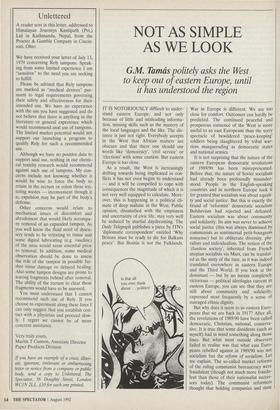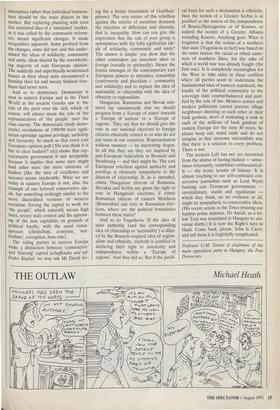NOT AS SIMPLE AS WE LOOK
G.M. Tanuis politely asks the West
to keep out of eastern Europe, until it has understood the region
IT IS NOTORIOUSLY difficult to under- stand eastern Europe, and not only because of little and misleading informa- tion, missing skills such as the mastery of the local languages and the like. The dis- tance is just not right. Everybody accepts in the West that African matters are obscure and that there one should use words like 'democracy', 'civil service' or `elections' with some caution. But eastern Europe is too close.
As a result, the West is increasingly drifting towards being implicated in con- flicts it has not even begun to understand — and it will be compelled to cope with consequences the magnitude of which it is not very well equipped to calculate. More- over, this is happening in a political cli- mate of deep malaise in the West. Public opinion, dissatisfied with the emptiness and uncertainty of civic life, may very well be seduced by martial daydreaming. The Daily Telegraph publishes a piece by ITN's `diplomatic correspondent' entitled 'Why Britons must be ready to die for Balkans peace'. But Bosnia is not the Falklands. War in Europe is different. We are too close for comfort. Outcomes can hardly be predicted. The continued peaceful and prosperous existence of the West is more useful to us east Europeans than the sorry spectacle of bewildered 'peace-keeping' soldiers being slaughtered by tribal war- riors masquerading as democratic states and national armies.
It is not surprising that the nature of the eastern European democratic revolutions of 1989/90 has been misrepresented. Before that, the nature of Soviet socialism had already been profoundly misunder- stood. People in the English-speaking countries and in northern Europe took it for granted that socialism was about equali- ty and social justice. But this is exactly the brand of 'reformist' democratic socialism Bolshevism had rejected and defeated. Eastern socialism was about community and solidarity. Its aim was never to achieve social justice (this was always dismissed by communists as sentimental petit-bourgeois nonsense) but to obliterate diversity, plu- ralism and individualism. The notion of the `classless society', inherited from French utopian socialists via Marx, can be translat- ed as the unity of the race, as it was indeed translated everywhere in eastern Europe and the Third World. If you look at the dominant — but by no means completely victorious — political ideologies current in eastern Europe, you can see that they are still about community and solidarity, expressed most frequently by a sense of outraged ethnic dignity.
But why does it seem to us eastern Euro- peans that we are back in 1917? After all, the revolutions of 1989/90 have been called democratic, Christian, national, conserva- tive. It is true that some dissidents (such as myself) had in mind something along those lines. But what most outside observers failed to realise was that what east Euro- peans rebelled against in 1989/90 was not socialism but the reform of socialism. Let me explain. The so-called market reforms of the ruling communist bureaucracy were fraudulent (though not much more fraudu- lent than those of their nationalist succes- sors today). The communist reformers thought that holding companies and state
enterprises rather than individual business- men should be the main players in the market. But replacing planning with even this restricted idea of a 'simulated' market, as it was called by the communist reform- ers, meant significant changes. It made inequalities apparent. Some profited from the changes, some did not, and this under- mined the ideas of solidarity, community and unity, ideas shared by the overwhelm- ing majority of east European opinion. The suddenly and superficially westernised bosses in their sharp suits encountered a hostility their fat and sweaty Stalinist fore- bears had never seen.
And so to democracy. Democracy is seen in eastern Europe and in the Third World as the ancient Greeks saw it: the rule of the poor over the rich, which, of course, will always mean the rule of the representatives of 'the people' over the class enemy. The democratic (truly demo- cratic) revolutions of 1989/90 were egali- tarian uprisings against privilege, authority and hierarchy. So much so that every east European opinion poll (Do you think it is fair to elect leaders?' etc) shows that rep- resentative government is not acceptable because it implies that some men might lead other men: the mere existence of leaders (like the idea of excellence and success) seems intolerable. What we see today in eastern Europe is not, alas, the triumph of our beloved conservative ide- als, but something strikingly similar to the more discredited versions of western socialism: forcing the capital •to work for the people', which naturally means high taxes, severe state control and the appoint- ing of the new capitalists on grounds of political loyalty, with the usual conse- quences (clientelism, cronyism, 'war- lordism', corruption, boss rule).
The ruling parties in eastern Europe make a distinction between 'constructive' and 'thieving' capital (schaffendes and raf- fendes Kapital: we may ask Mr David Irv- ing for a better translation of Goebbels' phrase). The very nature of this rebellion against the reform of socialism demands the rejection of difference and diversity, that is, inequality. How can you give the impression that the rule of your group is synonymous with the lofty egalitarian ide- als of solidarity, community and unity? The answer is simple: you show that the other contenders are somehow alien or foreign (racially or spiritually). Hence the frantic attempts of the contemporary east European powers to introduce censorship (controversy and pluralism v. community and solidarity) and to replace the idea of nationality or citizenship with the idea of ethnicity or regionalism.
Hungarian, Rumanian and Slovak min- isters say unanimously that we should progress from a 'Europe of states' towards a 'Europe of nations' or a 'Europe of regions'. They say that we should give the vote in our national elections to foreign citizens ethnically related to us who do not pay taxes in our countries. Representation without taxation — an interesting slogan. In all this they say they are inspired by pan-European federalism in Brussels and Strasbourg — and they might be. The east European rebellion against authority and privilege is obviously sympathetic to the dilution of citizenship. If, as is intended, ethnic Hungarian citizens of Rumania, Slovakia and Serbia are given the right to vote in Hungarian elections, if ethnic Rumanian citizens of eastern Moldavia (Bessarabia) can vote in Rumanian elec- tions, where are the political boundaries between these states?
And so to Yugoslavia. If the idea of state authority (and the corresponding idea of citizenship or 'nationality') is dilut- ed by the Brussels-inspired idea of region- alism and ethnicity, anybody is justified in declaring their right to autonomy and independence within a 'Europe of regions'. And they did so. But if the juridi-
cal basis for such a declaration is ethnicity, then the notion of a Greater Serbia is as justified as the notion of the independence of Bosnia-Herzegovina or of Kosovo, or indeed the notion of a Greater Albania including Kosovo. Anything goes. What is forgotten is that the notion of a southern Slav state (Yugoslavia in fact) was based on the same notion: the racial or ethnic same- ness of southern Slays, for the sake of which a world war was already fought (the first one). It is completely meaningless for the West to take sides in these conflicts where all parties seem to undermine the fundamental idea of western statehood, the loyalty of the political community to the sovereign state counterbalanced and justi- fied by the rule of law. Modern armies and modern politicians cannot prevent village neighbours shooting at each other in their back gardens, short of stationing a tank in each of the millions of back gardens of eastern Europe for the next 30 years. So please keep out, stand aside and do not imagine in that tiresome rationalistic way that there is a solution to every problem. There is not.
The western Left has not yet recovered from the shame of having backed — some- times reluctantly, sometimes enthusiastical- ly — the worst tyrants of history. It is almost touching to see self-confessed con- servative journalists such as Lord Wyatt backing east European governments revolutionary, statist and egalitarian which they think, on no evidence at all, might be sympathetic to conservative ideas. (His recent article in the Times praising our hapless prime minister, Dr Antall, as a fel- low Tory was translated in Hungary to uni- versal mirth.) It is now the Right's turn to blush. Come back, please, John le Carl* and tell them it is frightfully complicated.
Professor G.M. Tamils is chairman of the main opposition party in Hungary, the Free Democrats.



















































 Previous page
Previous page